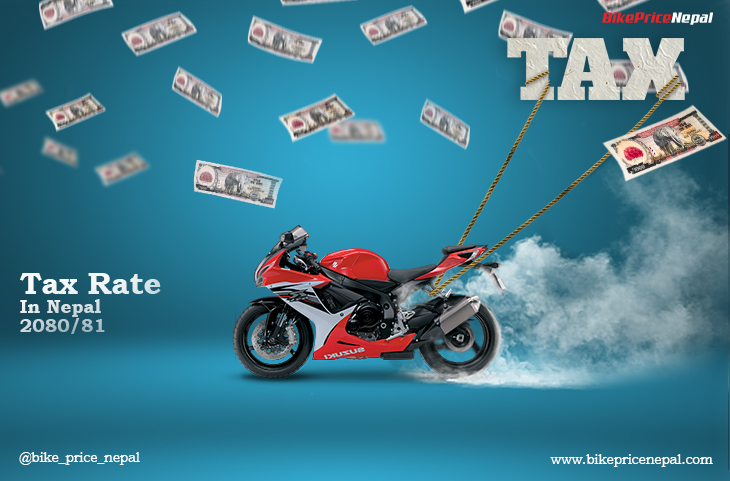Bike Tax Rate In Nepal 2080

In Nepal, the landscape of vehicular taxation is nuanced and varied, reflecting the diverse needs and priorities of different regions. One such aspect is the motorcycle tax, an annual levy that motorcycle owners must pay to comply with legal requirements and contribute to the maintenance of transportation infrastructure. As we delve into the specifics of motorcycle taxation in Nepal for the fiscal year 2080/81, we gain insights into the fiscal policies and regional dynamics shaping this domain.
Regional Disparities:
The taxation regime for motorcycles in Nepal is not uniform across the country. Instead, it varies from one province to another, with each state government setting its own rates. Notably, private two-wheelers registered in certain districts of Bagmati Pradesh, also known as Province 3, face higher tax burdens compared to their counterparts in other regions. Districts such as Kathmandu, Bhaktapur, Lalitpur, Chitwan, Dhading, Dolakha, Kavrepalanchok, and Makwanpur impose relatively higher annual taxes on motorcycles and four-wheelers.
Tax Structure:
The amount of tax levied on motorcycles is determined by factors such as vehicle type, engine capacity, and intended use. Private motorcycle owners in Bagmati Pradesh can refer to the following table for a clearer understanding of the annual tax rates applicable to their vehicles:
For Private Vehicles
Motorcycles & Scooters | Tax Amount Rs./year |
Up to 125 cc | 3,000 |
126 cc to 160 cc | 5,000 |
161 cc to 225 cc | 6,500 |
226 cc to 400 cc | 11,000 |
401 cc to 650 cc | 20,000 |
All over 651 cc | 30,000 |
Car, Jeep, Van, Microbus | Tax Amount Rs./ year |
Up to 1000 cc | 21,000 |
From 1001 cc to 1500 cc | 23,500 |
From 1501 cc to 2000 cc | 25,500 |
From 2001 cc to 2500 cc | 35,500 |
From 2501 cc to 2900 cc | 41,000 |
All over 2901 cc | 58,500 |
For Electric Vehicles
Motor Output | Tax Amount Rs./year |
350 Watt to 1000 Watt | 2,000 |
1001 watt to 1500 watt | 2,500 |
1501 watt and higher | 3,000 |
For Rental Vehicles
Car, Jeep, Van,Microbus | Tax Amount Rs./year |
Up to 1300 cc | 9,000 |
From 1301 cc to 2000 cc | 10,000 |
From 2001 cc to 2900 cc | 12,500 |
From 2901 cc to 4000 cc | 14,500 |
All over 4001 cc | 17,000 |
Late Fines and Compliance:
Timely payment of vehicle taxes is crucial to avoid penalties. In Nepal, motorcycle owners are legally obligated to renew their vehicle taxes annually. Failure to adhere to this requirement results in the imposition of late fines. However, there are certain provisions to alleviate the burden on compliant taxpayers. For instance, motorcycles and scooters that are renewed within three months of the expiry date are exempt from late fees. This grace period offers a reasonable timeframe for owners to fulfill their tax obligations without incurring additional costs.
Navigating Tax Deadlines:
Understanding tax deadlines is essential for motorcycle owners to manage their financial responsibilities effectively. For instance, a motorcycle tax due in Kartik (October-November) can be paid until the end of Magh (January-February) without incurring late fees. However, delays extending beyond three months from the expiry date attract fines, emphasizing the importance of prompt action to avoid financial penalties.
Time(After Expiry) | Fine(2080/81) |
Up to 1 month | 5% |
1 month - 2.5 months | 10% |
Up to Fiscal Year | 20% |
After Fiscal Year | 32% |
The motorcycle tax landscape in Nepal for the fiscal year 2080/81 underscores the significance of regional disparities, tax structures, and compliance mechanisms. As motorcycle ownership continues to proliferate, policymakers must strike a balance between revenue generation and taxpayer convenience. Moreover, efforts to streamline tax administration and enhance public awareness can promote greater compliance and contribute to the sustainable development of transportation infrastructure across the nation.
